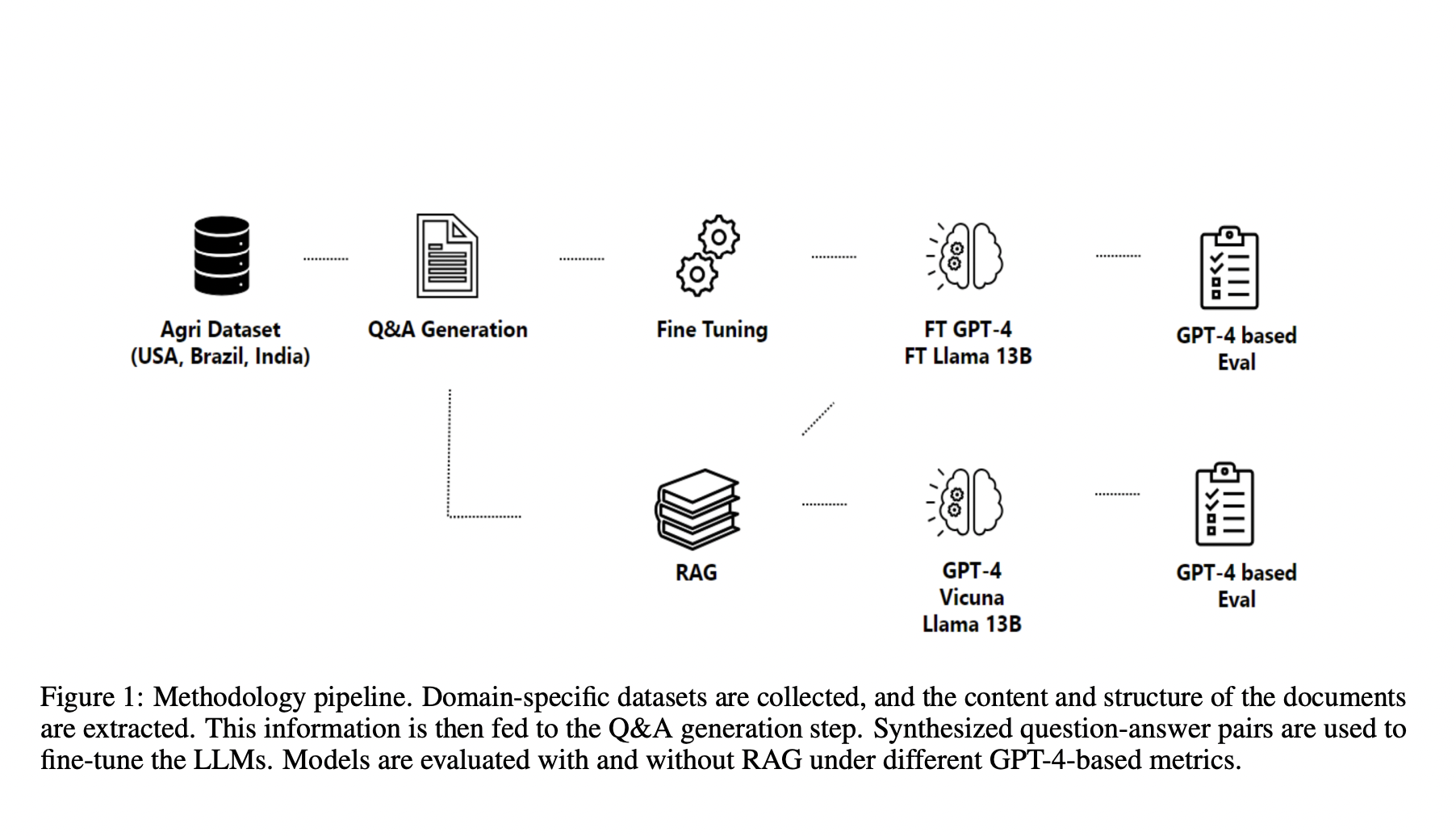This Report from Microsoft AI Reveals the Impact of Fine-Tuning and Retrieval-Augmented Generation RAG on Large Language Models in Agriculture

Great strides have been made in Artificial Intelligence, especially in Large Language Models like GPT-4 and Llama 2. These models, driven by advanced deep learning techniques and vast data resources, have demonstrated remarkable performance across various domains. Their potential in diverse sectors such as agriculture, healthcare, and finance is immense, as they assist in complex decision-making and data analysis tasks.
However, the integration of AI in specific industries, like agriculture, still needs to be improved due to the scarcity of specialized training data. This challenge is particularly acute in agriculture, an industry yet to fully exploit AI’s benefits. Standard tools such as GPT-4 and Bing provide general information but often need to address specific, context-sensitive queries essential in agriculture. This limitation stems from their need for more nuanced, location-specific knowledge in their responses.
Addressing this gap, researchers from Microsoft have introduced a pioneering pipeline that combines Retrieval-Augmented Generation (RAG) with fine-tuning methods to tailor LLMs for specific industries. This innovative approach involves a meticulous process of data collection and Q&A pair generation tailored to industry-specific requirements. The first step is to acquire relevant documents covering industry topics. Following this, the documents undergo a rigorous information extraction process. This phase is crucial, as it involves parsing complex and unstructured PDF files to extract textual, tabular, and visual information, along with the semantic structure of the documents.
The next step involves generating contextually grounded and high-quality questions that reflect the content of the extracted text. This process uses advanced frameworks to control the structural composition of inputs and outputs, thereby enhancing the efficacy of response generation from language models. The pipeline then employs RAG, which combines retrieval and generation mechanisms, to create contextually appropriate answers. The final phase involves fine-tuning the models with the synthesized Q&A pairs, optimizing them for comprehensive understanding and industry relevance.
The results of this approach have been particularly noteworthy in agriculture. For example, the accuracy of the models showed a significant increase when fine-tuned with agriculture-specific data. Fine-tuning alone led to an accuracy improvement of over 6%, with an additional 5% increase attributable to the RAG method. This marked enhancement in performance demonstrates the pipeline’s effectiveness in generating precise, context-aware solutions.
This research is a testament to AI’s potential to transform industries. By developing a pipeline that fine-tunes LLMs with industry-specific data, the research team has opened avenues for the application of AI in sectors that require nuanced, context-specific solutions. The integration of RAG and fine-tuning methods presents a significant advancement, enabling the creation of models that provide tailored answers, particularly in agriculture. This approach could serve as a blueprint for applying AI across various industries with specific contextual needs.
The research showcases a significant leap in AI’s application, particularly in agriculture, through a dedicated pipeline combining RAG and fine-tuning. This method enhances the accuracy and relevance of AI responses and paves the way for its broader application in industries requiring specific, context-aware solutions.
Check out the Paper. All credit for this research goes to the researchers of this project. Also, don’t forget to follow us on Twitter. Join our 36k+ ML SubReddit, 41k+ Facebook Community, Discord Channel, and LinkedIn Group.
If you like our work, you will love our newsletter..
Don’t Forget to join our Telegram Channel
![]()
Muhammad Athar Ganaie, a consulting intern at MarktechPost, is a proponet of Efficient Deep Learning, with a focus on Sparse Training. Pursuing an M.Sc. in Electrical Engineering, specializing in Software Engineering, he blends advanced technical knowledge with practical applications. His current endeavor is his thesis on “Improving Efficiency in Deep Reinforcement Learning,” showcasing his commitment to enhancing AI’s capabilities. Athar’s work stands at the intersection “Sparse Training in DNN’s” and “Deep Reinforcemnt Learning”.



